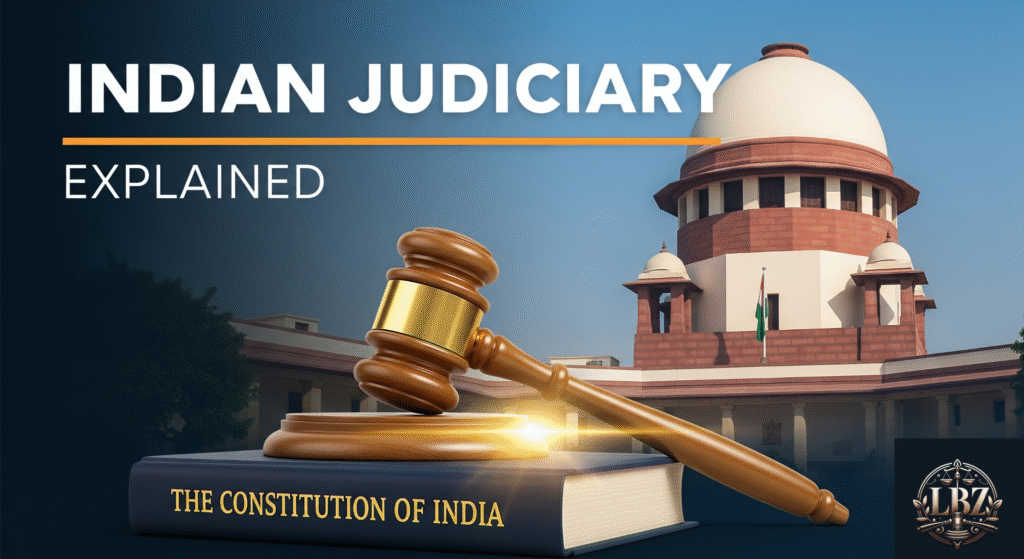India’s judiciary plays a crucial role in maintaining the democratic framework of the nation. At Legal Battle Zone, we believe that a deeper understanding of our judicial system is essential—not just for legal professionals, but for every citizen who seeks justice. Whether you’re navigating a legal dispute or simply interested in how justice works in India, this post will guide you through the structure, function, and importance of the Indian judiciary.
Table of Contents
The Backbone of Justice: India’s Judicial Structure

India follows a single, unified, and integrated judicial system, which means all courts, from the lowest to the highest, are connected and function under the same set of laws.
- 1. Supreme Court of India
At the top of the hierarchy is the Supreme Court, located in New Delhi. It is the guardian of the Constitution and the final court of appeal. It handles constitutional matters, civil and criminal appeals, and can even offer advice to the President of India.
- 2. High Courts
Each state (or a group of states/UTs) has a High Court, which hears appeals from trial courts and has the power to issue writs to enforce fundamental rights.
- 3. Subordinate Courts
At the base are District and Sessions Courts, Civil Courts, Criminal Courts, Family Courts, Various Tribunals and Forums that deal with local legal issues. These courts are often the first point of contact for individuals seeking justice.
Functions of the Judiciary: More Than Just Trials
The judiciary does far more than conduct trials. At Legal Battle Zone, we regularly engage with courts not only to resolve disputes but also to uphold rights and challenge unconstitutional actions.
Key Functions Include:
- Interpreting the Constitution
- Enforcing fundamental rights
- Settling disputes (civil, criminal, and constitutional)
- Conducting judicial review of laws and executive actions
Judicial Independence: Why It Matters
A strong judiciary must be independent to deliver unbiased justice. This is protected in India through:
- Secure tenure for judges
- Fixed service conditions
- Separation from executive influence
- Restrictions on post-retirement employment
At Legal Battle Zone, we staunchly support the independence of the judiciary, as it ensures our clients get a fair and impartial hearing.
Challenges: Justice Delayed Is Justice Denied
Despite its strengths, the judiciary faces critical issues:
- Over 4.6 crore cases pending across courts in India
- Shortage of judges and courtroom infrastructure
- Delays in proceedings, often due to procedural complexities
- Access to justice remains limited for marginalized communities
We address these challenges head-on by staying proactive, filing timely petitions, pushing for fast-track hearings, and educating clients about their legal rights.
The Way Forward: Reforms and Technology
The judicial system is gradually evolving:
- E-Courts and virtual hearings have improved access
- Fast-track courts help in time-sensitive cases
- Free legal aid is becoming more widely available
At Legal Battle Zone, we embrace these developments and use technology to make legal processes more efficient for our clients.
Conclusion: Empower Yourself Through Legal Awareness
Understanding how India’s judiciary works empowers you to take control of your legal rights. Whether you’re fighting a criminal cases, civil dispute, seeking constitutional protection, or simply in need of advice, Legal Battle Zone Law Firm is here to guide you through every legal battle.
We don’t just fight cases—we fight for justice.


Found this post very helpful to understand the concept in easy language.
Very helpful 🙂
This information is very important and it’s very helpful
Dhanyawad madam , waiting for next articles